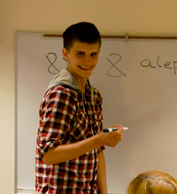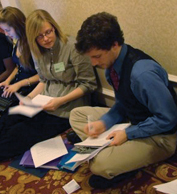Foreign Language in a Senior Center
Sophomore Brett Wilkes has been spending a lot of time at a senior community center this spring—but not for an internship or to play bingo. After meeting with leisure professionals through his Foundations of Recreation and Leisure class last fall, he decided to take his double major of German and linguistics to the Beverly Council on Aging and teach seniors foreign languages.
He has taught two weeks of Spanish and German and is planning to teach two weeks of Hebrew. “The participants have been enthusiastic about learning new languages and have really enjoyed the classes,” says Brett. He teaches basic phrases and vocabulary and creates puzzles and activities for reinforcement. “Seeing people excited and getting into the material is fascinating and quite worthwhile.”
Brett sees this as a valuable learning experience. “I’m looking at this as a way to discover and exercise gifts God has given me, and honor Him. It’s been a good way to build new friendships and share something I love—foreign languages.”
He is taking a sociolinguistics class with associate professor of German Dr. Gregor Thuswaldner, researching and writing about language use among the elderly. “We discussed the issue of how different generations use language—the way parents talk to children is labeled ‘parentese,’” says Thuswaldner. “We don’t have enough research when it comes to how we talk to older people, but I suggested there are parallels to ‘parentese.’ Brett was inspired by our discussion to write his paper on language use and the elderly.”
Brett submitted his paper to both Harvard and Cornell’s undergraduate student conferences in linguistics, and both schools accepted his paper. “This is a great example of what service learning in a Christian setting is all about,” says Thuswaldner. “It’s to combine our call to serve others and to do impressive academic work.”
Read More... Languages and Linguistics at Gordon
Representing ZambiaPeter Morse ’10
Last February I
was one of 30 delegates from Gordon who participated in the Harvard
National Model United Nations conference in Boston. As a political
studies major, I wanted to learn more about U.N. agencies,
parliamentary debate, and international development. This also seemed
like a great way to prepare for my fall 2009 semester in Uganda because
Gordon would be representing Zambia.
I served on the
Commission on the Status of Women, and our focus was family planning,
an issue of particular relevance for Africa. Sub-Saharan African
nations are in desperate need of greater gender parity and effective
programming to address HIV/AIDS, malnutrition, and lack of access to
education and jobs. Zambia’s own family planning efforts suffer because
of its impoverished, undereducated population, which includes over
1,000,000 people living with HIV/AIDS.
I prepared a report about
Zambian family planning initiatives, and during the four-day conference
I contributed to a final draft resolution, which summarized our
Commission’s conclusions about various worldwide problems and potential
solutions to poor family planning. Our resolution attempted to deal
with questions like “What U.N. agencies or national governments might
be able to fund development projects? Are rural health clinics more
important than urban health clinics? Should we urge all nations to
adopt birth control practices? How might we better educate children,
women, and especially men so they can take responsibility for family
planning in their communities?”
The African nations leveraged
our collective votes to ensure that the most powerful nations listened
to our concerns. I received an Honorable Mention award—the first time
Gordon has won anything at the Harvard Model U.N.—for taking the lead
in fighting for the interests of Zambia and other African nations, and
for assisting in drafting the final resolution.
Read More... Harvard National Model United Nations
Peter
Morse is a double major in political studies and biblical and
theological studies, and will study comparative African politics and
religions while in Uganda this fall. He hopes to work in civic or
international education.
Gordon in a Celtics Halftime Show Danielle Zorn ’09
Standing at center court before 18,624 Celtics fans during halftime with a trophy in one hand and a cane in another, senior Yegue Badigue ’09 received the Celtics Heroes Among Us award, highlighting his “inspiring journey and dedication to helping disabled people in need.”
Badigue, 28, born blind in the Republic of Chad, is studying international affairs and minoring in music. He dreams of “bringing economic empowerment to those left behind.”
The Beauty of Whale SongsSarah Mattingly ’09 spent the fall semester studying whale songs at Woods Hole, Massachusetts—something she’s always wanted to do—and learned about humpback whale social behavior from research and reading.
“The humpback whale song is very complex and beautiful, which helps when you have to listen to it for hours,” Sarah says. She digitized cassette tapes and learned to use computer programs to look at spectrograms—graphs of song frequencies plotted against time. She also attended lectures ranging from why tuna congregate around floating objects in the open ocean, to intricate details about the organisms that cause red tide, to why religion—specifically Christianity—has anything to do with science and nature.
“I researched whether or not song units get preserved through time, or if they die out like themes/entire songs,” she says. “What I found is that they do at least to some extent! This has lots of implications of how we think about their intelligence, social structure, memories, etc.”
Sarah hopes to study behaviors and vocalizations of whales and dolphins in the future and wants to work on whale-watching boats, talking to passengers about the different species and behaviors of whales.
On Molecular Toxicology and Fungal SpeciesLast summer Bethany Jenkins ’09 worked at Penn State’s College of Medicine in the Cancer Institute. Her project involved molecular toxicology, examining how, why and when chemicals affect cellular and molecular processes that lead to cancer. She spent time determining how genetic makeup influences a specific enzyme that affects production of antioxidants in the body.
Bethany also interned at Ohio State University, where she worked with the model fungal species Aspergillus nidulans and used molecular genetic techniques to create a strain that did not express the gene Ku80.
Bethany will attend Drexel University this fall to study microbiology and immunology. “I loved working with Aspergillus nidulans and would like to study disease-causing fungi in graduate school. Infections by a yeast species have been rising in people with suppressed immune systems. I’m very interested in how yeast cells adhere to human cells and the special mechanisms they use to bypass the immune system or build resistance to drugs.”
A Service for Students with DisabilitiesMany students struggle with disabilities while getting a degree. The Academic Support Center (ASC) is a liaison between students with disabilities and faculty, setting up appropriate accommodations like recorded audio books, quiet testing areas, extended time on tests, notetakers during classes and special advising. They also help with time management, study skills, issues related to learning disabilities and ESL as well as general troubleshooting.
“The ASC did an excellent job helping people understand my disability without making me seem like a victim,” says senior Sarah Lambert, who has an unknown illness with her legs. “They said to professors, ‘Look, this is what Sarah can offer. Help her find a way to use her gifts.’”
Explore... Academic Support Center
<< BACK



